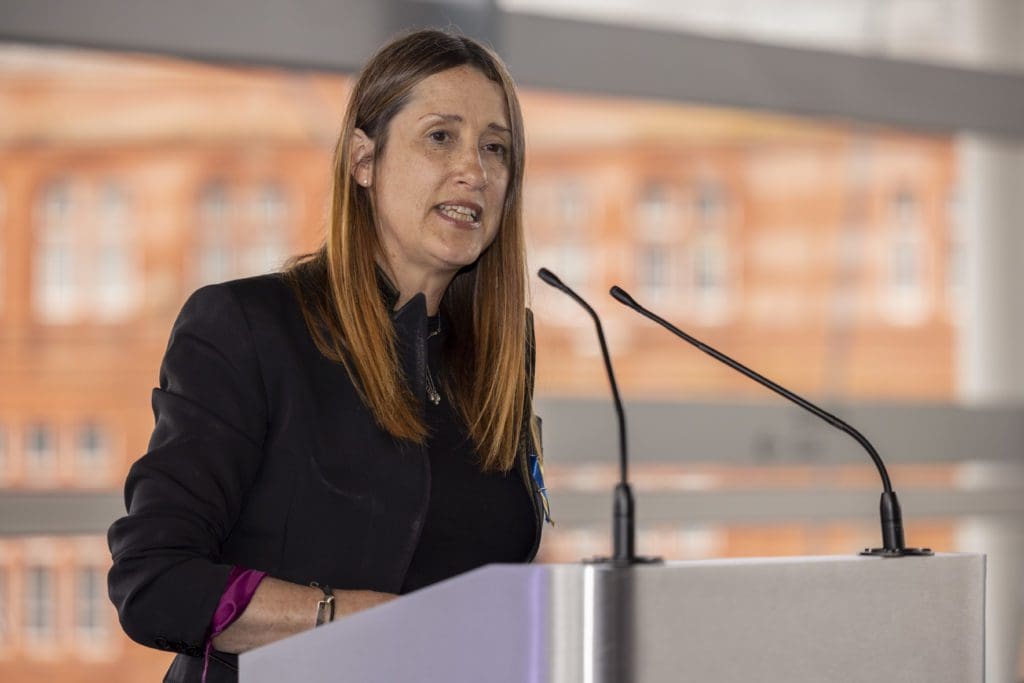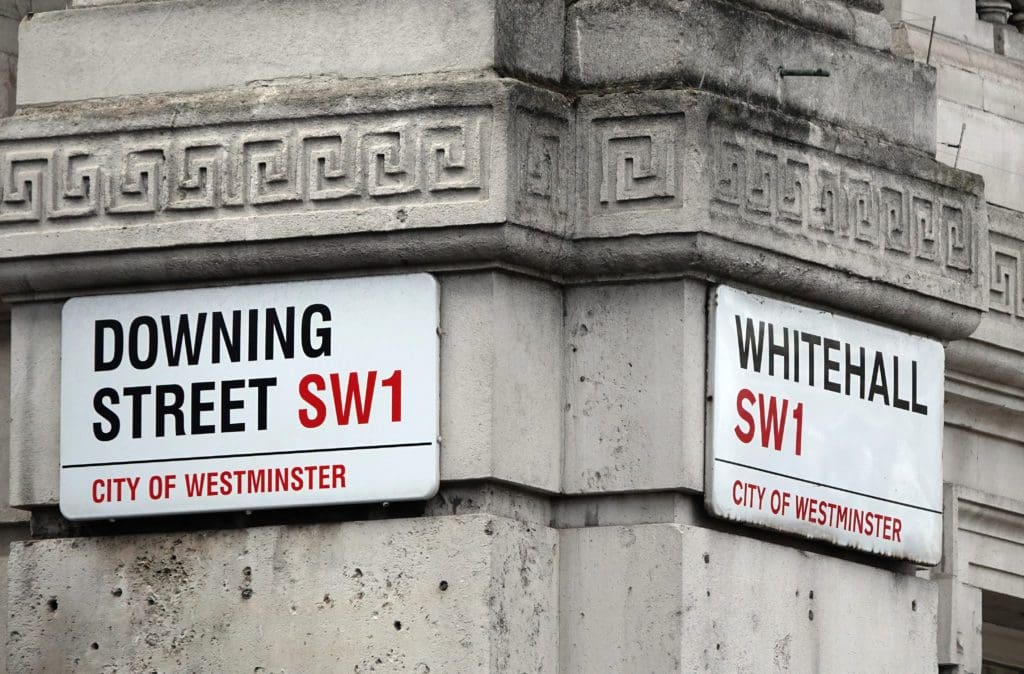Rebecca Evans, the Welsh Government’s Finance Minister, has said today’s Autumn Statement will mean people are paying more for less.
The Chancellor’s statement confirmed tax rises for people across the United Kingdom along with deep spending cuts in future spending review periods.
Forecasts from the Office for Budget Responsibility have indicated the biggest fall in disposable income since records began, with household incomes not expected to get back to pre-pandemic levels until 2028.

Rebecca Evans, Minister for Finance and Local Government, said:
“We should be under no illusions; this statement confirms we are in a deep recession. Real incomes are set to fall by 7% over the next two years, while inflation is at its highest rate in 41 years.
“Today’s Autumn Statement is an invoice for the UK Government’s failure to manage the economy over the last 12 years.
“It provides pain today and pain tomorrow, with higher taxes and energy costs now and spending cuts to come. Ultimately, it leaves people paying more for less.
“Throughout this process I have made clear to the Chancellor that Wales cannot afford deep and damaging austerity. I am relieved that the Chancellor has at least partially responded to my calls for more funding for public services in the here and now.
“However, let me be clear that today’s statement doesn’t even come close to providing the funding needed to protect public service budgets against the immense challenges caused by record inflation.
“We will be carefully analysing the detail of today’s announcements ahead of our December budget.”

Responding to today’s budget at Westminster, Welsh Liberal Democrat Leader Jane Dodds MS said:
“Every single tax rise and spending cut in this budget has come about because of the incompetence of the Conservative party.
“While Boris Johnson and Liz Truss have trashed our economy, hardworking Welsh people are now being left to pick up the pieces of their destruction, including having their income squeezed like never before and living standards falling.
“Meanwhile Welsh Conservatives in the Senedd have supported this destruction feverishly from the sidelines.
“A recession that is set to wipe out 8 years of rising living standards with standards falling 7 per cent over two years, that is the price of a Conservative Government.
“This Conservative chaos will hammer ordinary people and the services they rely on. They should hang their heads in shame.
“People in Wales demand better. Welsh Liberal Democrats are ready to play our part in sweeping the Conservatives away and offering a positive vision for a fair deal for the people of Wales.”
Reaction from businesses

Paul Slevin, Executive Chair of Chambers Wales South East, South West and Mid, said:
“The Chancellor has stayed true to his word in focusing on financial stability and targeting support for the most vulnerable in society. But in the teeth of a recession, this statement will not increase business confidence.
“Businesses will look at today’s announcements and welcome support with business rates, and retention of the employment allowance, though the reduction in the dividend allowance will impact many smaller firms.
“Almost half of businesses tell us they will find it difficult to pay their energy bills once the Government’s Energy Bill Relief Scheme ends on 31 March 2023. The sooner we get clarity on where future support will be targeted the better.
“It is good to hear plans to improve energy efficiency across the economy, but we need to see greater urgency as firms battle with their bills in the here and now.
“It is also good news that Sizewell C will proceed, and we are relieved that HS2 and Northern Powerhouse Rail have not been cut further. These projects will provide a major boost to regional economies as well as improving our national infrastructure.
“The Government must do more to improve conditions for businesses to invest and grow, otherwise we will be starting from a weak base to power our recovery once global economic conditions stabilise.
“The Chancellor’s Statement is light on green innovation, doesn’t address current labour shortages and has nothing on boosting export led-growth.”

Lloyd Powell, Head of ACCA Cymru/Wales, said:
“Above all, today’s announcement needed to provide stability, and set out a plan to put the UK economy on a surer footing, following months of volatility. This has been achieved to some extent, with tax and spending plans allowing businesses to think ahead, even if circumstances remain exceptionally difficult.
“While more of us being asked to pay more tax was not a surprise, it’s nonetheless disappointing for both consumers and businesses battling headwinds of rising costs. Further, real-terms cuts to public spending will undoubtedly have knock-on implications for public services and the economy.
“While greater certainty is welcome and we look forward to early sight of the details, today’s statement provided few bright spots about the path back to economic growth. As businesses hunker down, it will become more important than ever for government to pump-prime investment and business growth.
“Businesses in Wales will now wait to hear how the Welsh Government’s tax and spending plans will be shaped by today’s announcement, in the hope that this doesn’t translate into less competitive rates of tax, whether on income or property.”
On tax:
“While a routemap for tax changes ahead is useful, wage inflation has raised the spectre of fiscal drag. Scrutiny and transparency about the implications of these tax changes will be key, especially where taxpayers find themselves subject to additional administrative requirements. Many more businesses (and individuals) will find themselves caught in the VAT and CGT regimes, at a time when HMRC is already under severe pressure.
“We remain disappointed about the lack of progress in simplifying our tax landscape – as greater simplicity, certainty and stability in our tax system would undoubtedly create a better business growth environment.”
On public spending:
“Going into the Autumn statement, OBR analysis showed that UK departmental spending is now only 90% of its real value compared to 2010, and capital spending – which is vital to boosting overall productivity – has fallen to a staggering 78% of 2010 investment in real terms. The Covid backlog in public services, from hospital waiting times to courts to HMRC service levels, is likely to deteriorate further with real terms cuts to spending.”
On energy costs:
“Our members suggested that the current energy support package for firms does not go far enough, with a more targeted approach required, especially for sectors where energy costs are disproportionately high. As they look ahead to the next financial year, many small businesses will have been disappointed not to hear more detail about support likely to be available from April.”
Following the release of the Autumn Statement, delivered by the Chancellor Jeremy Hunt, FSB Wales Policy Chair Ben Francis said:
“Today, we heard the Chancellor say he will help Britain face into the storm. Our members have had their faces into the storm for some time.
Small businesses are facing soaring costs, rampant inflation, falling revenues, difficulty accessing affordable finance and rise in invoices being paid late.
We have called for measures to not just balance the books, but boost prosperity, growth and jobs.
Instead, some of the measures today threaten to constrict small businesses.
We welcome the stay on the reversal of the hike in National Insurance, which recently came into effect, freezing the threshold at a time of such high inflation is a stealthy hike in the jobs tax.
While we were pleased to see the retention of the Employment Allowance at its current level, which was hard fought for by FSB, and the continuation of the lower National Insurance rate for the self-employed and employees, we remain disappointed in the Chancellor’s decision to slash the dividend taxation allowance, which poses another threat to hard-working owners of small businesses.
The Chancellor’s announcement of a transitional relief on businesses rates is welcome news for businesses in England, although the decision to introduce such a scheme in Wales will be taken by the Welsh Government.
Welsh Government needs to look at consequential funding from this scheme to buy breathing space for hard pressed Welsh businesses, to protect employment. We will now want to work with Welsh Government to consider how we can reduce the business rate burden in Wales, through measures such as the reinstatement of the 100% rates relief holiday. Measures such as this can play their part in protecting some of our most vulnerable but important community businesses.
It is welcome that the Chancellor recognises the immense pressure sky rocketing energy prices have placed on small firms, and the continuation of the energy support package until April. However, it is imperative that continued support should be viewed through the lens of the size of the business, rather than specific sectors.
Businesses want to know, with urgency, the support that will be available after April- as they have no certainty with which to plan their future costs.
Our latest Small Business Index results suggest almost 35,000 small businesses in Wales are expecting to downsize, close or sell their business in the coming months. The urgency to support the small business economy cannot be overstated. “
Commenting on the Autumn Statement, Marco Forgione, Director General of the Institute of Export & International Trade said:
“The Chancellor addressed a number of the specific issues we raised around levelling-up, business support and investment. Having called for certainty for businesses during what is a very volatile economic cycle, I think today we got the first semblance of that.
“Nonetheless confirmation that the UK is now in recession is a cause of real concern to our members as was the analysis from the OBR that trade volumes are likely to decline over the medium-term.
“The removal of import tariffs on over 100 goods shows a commitment to supporting the manufacturing sector which we particularly welcome. The Chancellor also highlighted the export opportunities of nuclear energy. We will continue working closely with DIT and BEIS, on behalf of our members, to showcase the wide range of export opportunities across the energy sector.
“Although the Overseas Direct Aid target has to remain at 0.5% for the forecast period, we ask the Chancellor to review this as soon as the fiscal situation allows, in order to return to the 0.7% target which is so important.
“Support announced today for the devolved administrations is also substantial and the Advanced Technology Research Centre in Wales will further heighten the UK’s specialism in technological development. We look forward to working with our partners in DIT and BEIS to support the Northern Ireland Trade and Investment Event also announced by the Chancellor today and driving new investment into Northern Ireland. Road infrastructure is also crucial for trade logistics, so we hope that the discussion between the Government and the Scottish Government on the A75 will be productive. We also call the Government to recognise, as part of its prioritisation of infrastructure modernisation, the need for the Single Trade Window project to continue being developed.
“As ever, these announcements will need detailed scrutiny. For example, there are SMEs throughout the country which may be questioning the ramifications of the announced cut in deduction rate for the SME R&D scheme to 86% and the credit rate to 10%. Nonetheless, today’s Autumn Statement was a step in the right direction.”
Will Matthews, Head of UK Commercial Research for Knight Frank said:
“This was always going to be a statement full of difficult compromises, but it leads to two potential opportunity areas for the real estate sector, one practical and one structural. Firstly, as government departments come under even greater financial pressure, there will be an added incentive to release assets or sites for sale or redevelopment.
“Secondly, although the government recommitted to a number of investment projects and growth in capital spending, there will also be a growing role for the private sector to drive economic, technological and social infrastructure, should it wish to. Is that an attractive proposition? The real estate sector’s contribution to the success of UK life sciences, health care, education, data centres and countless other areas suggests that for the right opportunity, it certainly can be.”
Following Chancellor Jeremy Hunt’s much anticipated budget announcement, which has seen widespread tax increases and spending cuts, Michael Jones, partner at Bevan Buckland shares his thoughts:
He said: “The measures announced today will have a significant impact on the lives of millions of people across the UK.
“Many people will be concerned about their financial stability as we move into the new year as a result of the planned tax rises, coupled with the reduction in energy saving support from next April and the planned increases to council tax in many areas. From the stealth tax to the reduction in the threshold for the top rate of income tax, millions more people will be paying more tax after today’s announcements, with middle and higher earners being hit the hardest.
“The announced spending cuts will also have a wide-ranging impact across the country, with businesses across all sectors re-evaluating their spending from today.
“With the planned changes to the dividend allowance, increase in the dividend tax rate and increase in corporation tax rate this will have a significant impact on small businesses owners.
“While there was some encouraging news that the National Living Wage is set to increase, while state pensions and benefits will also rise with inflation, there is little to rejoice about when we face a recession and a cost of living crisis.
“The Chancellor himself has admitted that these are very difficult times and that these measures are necessary to balance the books. From our perspective, we will be on hand to help people navigate these changes and to ensure they have an effective tax planning strategy in place.”
Charities
Age Cymru’s response to today’s Autumn Statement:
“We are relieved that the UK Government has listened to older people and decided to re-instate the triple lock on State Pensions.
“This will provide a degree of assurance to thousands of pensioners in Wales who have been fraught with worry about they about how they would pay their food and energy bills.
“There will also be some relief amongst the thousands of older people in Wales who rely on benefit payments to meet their daily living costs, following the government’s announcement to increase the level of support.”
Natasha Davies, Policy and Research Lead, Chwarae Teg, said:
“Today’s statement is a missed opportunity to deliver an economy that tackles inequality and supports women.
“With the consequences of the cost of living crisis disproportionately falling on women, it is unfortunate that the Chancellor has chosen to embark on a journey of austerity-lite. Especially since women and communities across Wales are still struggling with the consequences of the last programme of austerity. The Chancellor’s decisions will again see those who are least well-off in society paying for mistakes they did not make.
“Planned restrictions on public sector spending will do little to support our economy. These measures will disproportionately impact women who are more likely to use and work in public services, making tackling gender inequality even more difficult.
“In order to meet the current economic challenge and deliver an economy that works for women, we needed to see investment in people, skills and vital public services. Supporting more women into and to progress at work is a vital way to ensure both equity and growth in the economy. The Chancellor’s proposals fall well short of this.
“Although commitments to up-rate benefits in line with inflation, increase the National Living Wage and some initial steps towards more progressive taxation of wealth are welcome, restrictions on public spending, increased conditionality for those on Universal Credit and changes to the energy price cap will see many women and families no better off.
“It is vital that the UK Government centres tackling gender inequality in its budgetary decisions in order to better support women, and meet current economic challenges head-on.”

